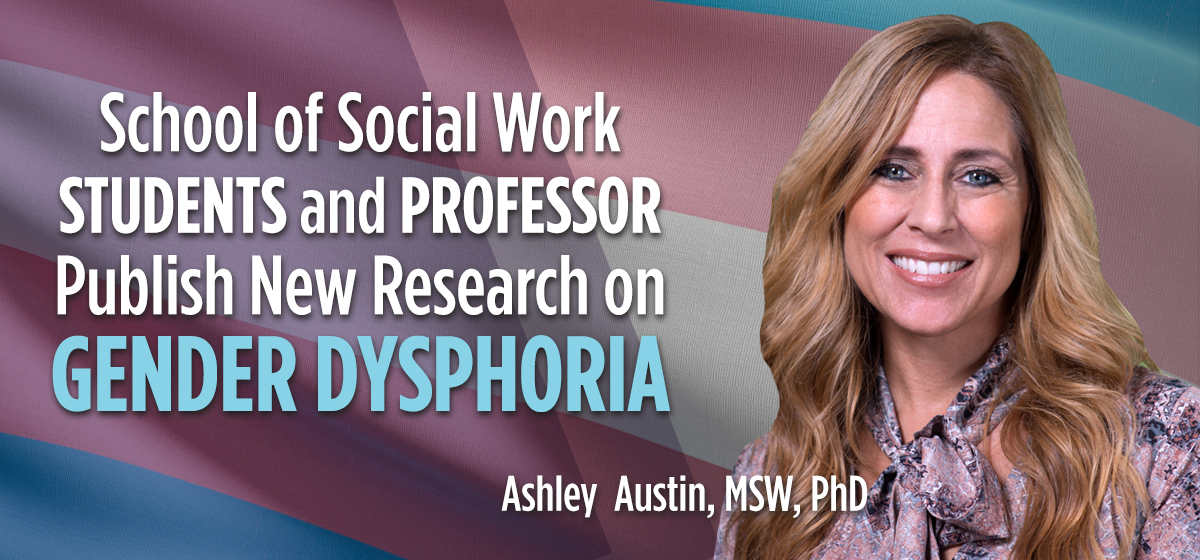A new paper published in the peer-reviewed journal Psychology of Sexual Orientation and Gender Diversity is giving voice to members of the trans community who suffer from gender dysphoria. “Beyond Diagnosis: ‘Gender Dysphoria Feels Like a Living Hell, a Nightmare One Cannot Ever Wake Up From’” is the work of Barry University Professor of Social Work Dr. Ashley Austin and her student co-authors, Joshua Holzworth and Ryan Papciak, who served as the study’s project director and research assistant, respectively.
Recognizing a scarcity of transgender perspectives within the current body of research on gender-affirming care, Austin and her team wanted to better understand the impact of gender dysphoria by hearing directly from those who have lived the experience, namely transgender adults. Through social media, they enlisted the help of 362 trans participants, who agreed to share their demographic information as well as their written response to the question, “In your own words, what does gender dysphoria feel like to you?”
The survey enabled Austin, Holzworth, and Papciak to better understand the backgrounds of their participants — their race and ethnicity, their community, their gender identity and sexual orientation — but it was the responses to the open-ended question that provided the most consequential data. In their own words, respondents reached for metaphor and symbolic language to describe what many felt to be indescribable. The lack of a linguistic framework for the varied experiences of gender dysphoria was immediately apparent, as Austin and her team examined responses such as, “It feels like a knife in me,” or “like drowning.” Frequently, participants described their emotional turmoil in terms of physical pain, and many felt the ongoing sense of not being seen by the external world and of living in an imposter’s body.
“It is particularly noteworthy,” Austin and her co-authors write, “that participants acknowledge they have a body—just that it does not belong to the self; rather, self is described as being located in the mind or the brain, whereas body is seen as belonging to someone else . . . or as a separate entity doing battle with the self. For instance, a 20-year-old white transgender man stated the following: ‘I know in my head I am a boy, but my body says otherwise, and it feels like I’m losing.’”
As a team, Austin, Holzworth, and Papciak brought a diverse set of clinical and personal experiences to the study, though they entered the project aware of the limitations imposed by their individual identities. This was particularly important to the study’s qualitative framework, which emphasized the thoughts and feelings of trans and gender-diverse participants. To minimize any personal influence in their data assessment, the team engaged in frank conversations about pre-existing beliefs and worked together to interpret each participant’s response. The result is a study that reinforces the necessity of gender-affirming clinical practices and forwards the research space with rich and evocative testimony from the trans community. For Austin and her co-authors, who hope to dispel the myth of a monolithic trans experience, the study illuminated the urgency of suffering among gender-dysphoric patients as well as potential pathways for positive interventions, particularly those that leverage metaphor and non-verbal creative expression.
Austin serves as Research Director and Principal Investigator for Barry’s Trans Perspectives Research Lab, a research arm of the Center for Human Rights and Social Justice. Her work has long been geared toward improving mental health care and social services for the transgender and gender-diverse (TGD) community through trans-affirmative practices. Holzworth earned his BSW at Barry and is now pursuing his master’s at the University of Michigan School of Social Work. Papciak is a PhD candidate in Barry’s School of Social Work and a longtime advocate for the trans community. About Holzworth and Papciak, Austin says, “These are some of the best students I have ever worked with — so it was a treat for me.”

